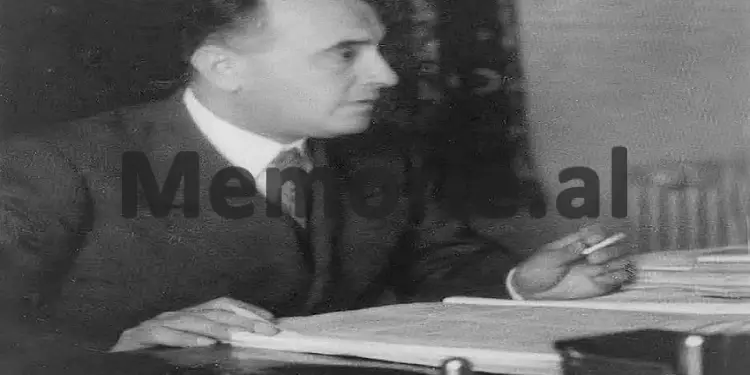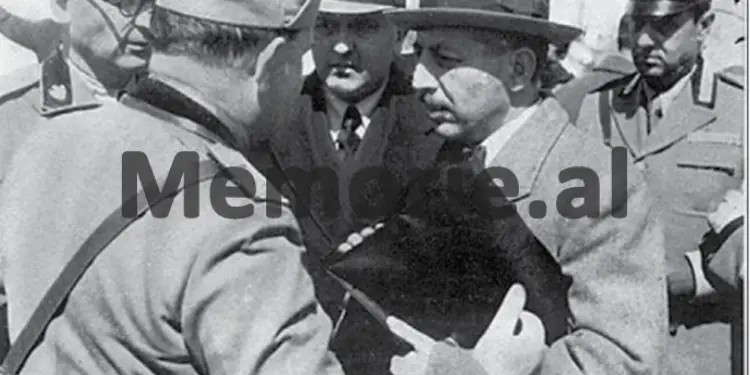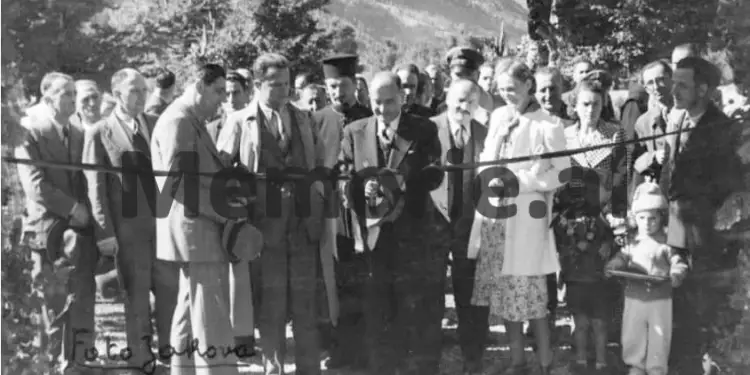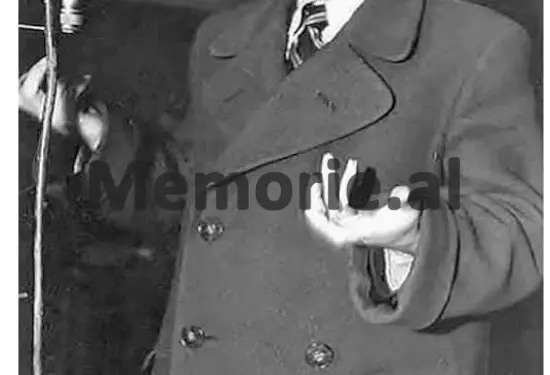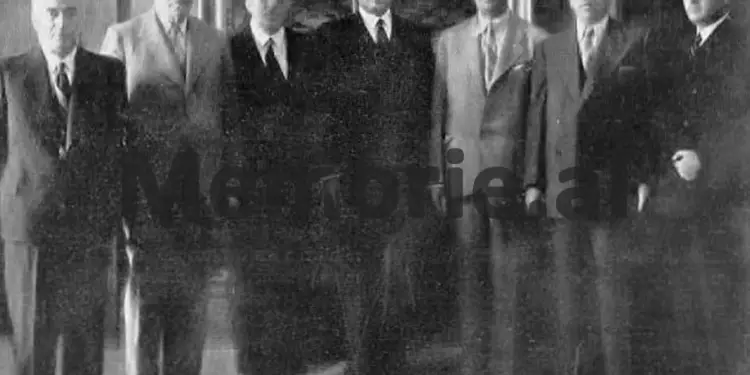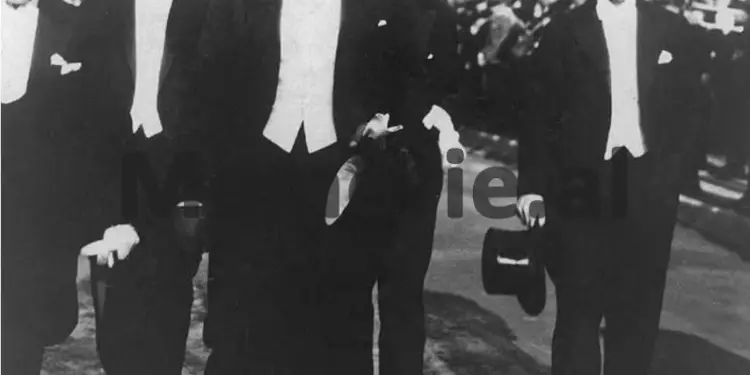From Skifter Kelliçi
Memorie.al / In the summer of 1951, when I was only 11 years old, I went back to Shkodër, the city where my mother was born. But if years ago, when I was very young, I had not gone further than the old cemetery, where somewhere there, then the “Migjeni” Theater was built, this time together with a cousin of mine, who is older than me, encouraged by some of the stories in the volume “Shadows of the Mountains” by Ernest Koliq, which I had read secretly, because it was a forbidden book, we went further. We passed the “Firej” village, then the “Geraj” street, and through a gate that had remained open, we saw the cobbled courtyard, the garden with colorful flowers and a large, stone house, just as Koliq described it.
– This is Rrok Gera’s house, – my cousin told me, in a low voice, as if he was afraid that no one would hear us, even though we were alone on the street. – He has been in prison for years, because he was the Minister of Finance at the time of Zog. But here in Shkodër, they praise him for being a well-spoken and very good man.
In 1954, a year before I finished high school, a girl from Shkodra came to host us on the first floor of our house, where a family from Shkodra lived. I met her and was surprised when I learned that she was the daughter of Rrok Gera, the Minister of Finance who was still in prison, sentenced to 20 years…
She would finish her measured a year later, but as she told me, she had no hope of continuing her higher studies, even though she was an excellent student. And the reason was guessed. “But my father has not done anything to the detriment of the people to deserve this heavy punishment”, she told me then, full of sadness.
And that’s how she ended up as a teacher in the villages of Burrel. In the spring of 1960, already a journalist at Radio Tirana, I had the chance to be in Shkodër again, to write a report. And lo, in the “Big Coffee,” as it was called, I met my cousin again. While we were drinking coffee, we saw a somewhat old, tribal-looking man enter, who was warmly greeted by others, who they invited him to sit at the table with them.
– This is Rrok Gera, about whom I once told you, – my cousin told me. – It has been two years since he was released from prison. He was acquitted and now, he works somewhere as a simple clerk, when he could have been a rare specialist in the Ministry of Finance, where he worked in the 30s, after finishing his studies in Austria.
I was reminded of all these events after reading the book “Rrok Gera, life and deeds” by Prof. Dr. Vladimir Misja, in which, of course, he reads events and other detailed facts that reveal not only the biography and activity of this great Albanian economist, but also a part of the history of Shkodra and Albania in the economic field, at the end of 19th century and in the first decades of the 20th century.
But I also remembered the author himself, Vladimir Misja, also among the most well-known economists, this turn of the second half of the last century and today, academic, winner of the “Republic Award” for high scientific activity, author of many important works in the field of economics, whom I got to know in the early 50s, when he returned from his higher studies in the Soviet Union, also as one of the best basketball referees of those years.
The book “Rok Gera, life and works”
His new book, “Rrok Gera, life and works”, is a portrait of this outstanding personality in the field of finance, who, like other researchers, fell prey to the brutal communist dictatorship, only because they tried , as Rrok Gera himself claimed in the judicial process, that everything he had done, he had done for the good of the country.
When I read these lines in the book, I remembered another famous financier, Haxhi Shkoza, who finished his higher studies in Istanbul, who after the establishment of the communist dictatorship, really did not end up in prison, but remained a simple accountant in a company in Tirana , at a time when his work “Finances in Albania”, published in 1935, was examined by all our researchers in the economic field and already in the year of publication, was described by Rrok Gera as: “…a precious friend of all those who wish to complete their knowledge on the financial situation of our state…a work that summarizes the financial legislation of Albania”,(“Rrok Gera, life and works”, page 78)…!
After studying with very high grades at the Faculty of Economics of the University of Vienna, Rrok Gera had every opportunity to stay in Austria, but he decided to return to his homeland and in 1930, to start working at the Ministry of Finance for to become, first, general secretary and to prepare over 70 important draft laws on issues of the tax system and to establish the first scientific magazine, entitled “Albanian Economist”.
For special merits at work, in 1935, Rrok Gera was appointed Minister of Finance in the government of Mehdi Frashër, called “of the youth”, which called for closer relations with Italy”, while in the internal plan , was committed to improving and strengthening the administration, developing culture, art, education (“Rrok Gera, life, work”, page 80). Also, the government would fight for the eradication of nepotism and corruption as well as fight for the independence of the judicial system. (Yes there). But this program was opposed in parliament and the government was forced to resign. Along with him is Rrok Gera.
This was the first stage of his activity. Then, for Rrok Gerën, the Foreign Ministry of Great Britain (Forein Ofis) would say this: “In October 1935, he was given the portfolio of the Minister of Finance in Mehdi Frashër’s cabinet. He came to the workplace full of enthusiasm. But there was limited freedom in his initiatives to make radical changes in the financial administration, during the short term of Mehdi Frashër’s government. “Rrok Gera…”, page 80).
The second stage of Rrok Gera’s activity, in the field of finance, is his reappointment as Minister of Finance, on June 5, 1938, until April 7, 1939, where he would become one of the protagonists in the efforts to stop the invasion of Albania from fascist Italy. It was the moment when Mussolini asked King Zog for control of all ports, communications, roads and aerodromes…; to have an Italian adviser in every ministry; who should be recognized in Albania with the same political rights as Albanians… (“Rrok Gera…”, page 86).
These demands in the form of an ultimatum were nothing more than the prologue to the invasion of Albania. As described in the book, on the eve of the invasion, the highest dignitaries of the state gathered at the house of the Prime Minister, Koço Kota. It was decided that a delegation would be appointed to talk with General Guxoni, commander-in-chief of the Italian army, and although “…he was not the foreign minister nor the commander of the army, this task was entrusted to Rrok Gera (“Rrok Gera…” , page 90).
But the fascist government ignored the talks with the Albanian delegation, headed by Rrok Gera, who sought to do what was possible to avoid the fascist invasion of April 7, which he described as; the most terrible day of his life (“Rrok Gera…”, page 91). About his role in the talks of April 7, 1939, it was also written in the magazine “Historical Studies” no. 1 of 1964 and no. 3 of 1976). In this situation, Rrok Gera decided to leave together with his family to Larisa, Greece. Then he asked to return to his homeland, but the fascist authorities did not allow him. They even exiled him to Italy, as well as other members of his family. He returned to his homeland only after declaring that he would not deal with political issues.
The third stage of Rrok Gera’s activity is related to his efforts to nationalize the Albanian Bank in 1944, when Albania was occupied by Nazi Germany. It is the period when the positions of Italian capital in the National Bank of Albania, after Mussolini’s capitulation, began to waver. However, “…the Italian managers of the Albanian National Bank had received a directive to make all efforts to preserve the interests of the Bank’s financial group intact. (“Rok Gera….”, page 98).
In these circumstances, completely contrary to his principles, character and desire, Rrok Gera, in the middle of 1944, finally agreed to become the Minister of Finance. “The family members remember that, the last time, to take him from the house almost by force, a car and a truck came with armed men…! For Gera, the time had come to implement his project for the nationalization of the Bank. (“Rok Gera…” page 104). This project was dropped with the objections of Fejzi Alizot and Eqrem bey Libohova, who had declared that: “in such a project, he would never throw his signature” (“Rrok Gera…”, ibid.).
Returning to Shkodër, after release from prison
Under these circumstances, the government resigned and Rrok Gera returned to Shkodër. He had the opportunity to leave Albania, but he saw fit to stay, because as I mentioned above “everything he had done was for the good of the country”.
However, in January 1945, he was arrested and sentenced by the so-called ‘Special Court’ (in March-April of the same year) to 10 years’ imprisonment, although there was no witness against him, and he was released from prison with an amnesty in November 1949. But, on April 21, 1951, he was arrested again. And, although again there was no evidence against him, he was sentenced to 20 years of imprisonment, on the charge that: “… he helped in the invasion of Albania and sabotaged the resistance of the Albanian people” (“Rrok Gera…” page 106).
Finally, on May 15, 1958, by decision of the High Court Plenum, Rrok Gera was declared innocent and released from prison. In his house in Shkodër, where he was born, he found his two daughters, but not his wife, Gjyljeta, who had died in 1955, when he spent the terrible years in Burrel prison. Rrok Gera passed away on January 28, 1969, after working as an accountant in a factory. He left being respected by the people of Shkodran, as open and friendly as I knew him from afar, on that spring day in 1960.
I said above that the book “Rrok Gera, life and work” is also a part of our history. And not without reason. Academician Vladimir Misja has managed to combine the life of this well-known economist, a victim of the communist dictatorship, with the social-economic conditions of Shkodra and Albania, also illustrated with facts, documents and photos from a period of more than a century, expanding in this way also the horizon of the reader.
Not only that..! Rrok Gera’s articles, from the years of his studies in Austria and up to 1940, located at the end of the book, are an overview of the economic developments of Albania in those years and the efforts to make them move at a pace as fast as possible high, regardless of the difficulties of the time. Memorie.al




